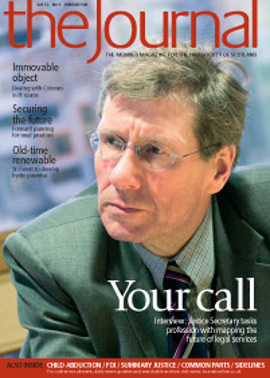Let youth have its say

The Legal Services Act, which will radically reform the framework and regulation of legal services in England and Wales by implementing the recommendations of the Clementi Report, received Royal Assent in October last year, and the first reforms are expected to be operational by 2009-10. This legislation will enable new forms of legal practice to develop: legal disciplinary practices or LDPs (organisations involving different kinds of lawyers but still providing legal services only); multi-disciplinary practices offering a one-stop shop for clients; and non-lawyer ownership of legal businesses, colloquially known as “Tesco law”.
Following the recent OFT super-complaint by Which?, a similar approach north of the border now seems inevitable, and should, perhaps, be welcomed.
The debate in Scotland, which ought to be informed by all solicitors young and old, was initially driven by consumer protection and the promotion of access to justice. It has now evolved into how the provision of legal services in Scotland can be modernised in such a way as to protect the interests of consumers and the integrity of the profession in Scotland.
The Law Society of Scotland's consultation paper outlines four different alternative business structure (ABS) models:
- Legal disciplinary practices, which would allow solicitors, advocates and registered foreign lawyers (including barristers) to practise as partners in the same firm or members in the same incorporated practice;
- Multi-disciplinary partnerships, which would allow solicitors (and advocates) to join forces with other non-lawyer professionals who could also be partners;
- A shareholding option, which would allow non-lawyers to hold shares in an incorporated solicitors' practice without becoming directors of the practice. These shareholders would have a share in the ownership of the business, but no control;
- Non-lawyer ownership and control, which would allow non-solicitors to own and control legal practices.
Young lawyers should not underestimate the importance of their contribution to the Society consultation, which will have far reaching consequences for every
person working in legal services the length and breadth of the country. Implementation of ABSs could impact upon every aspect of legal practice: the promotion of the “solicitor brand”; firms' relationships with advocates, who could work as partners of law firms and pitch directly to clients for work; investment in law firms by non-lawyers and external equity finance for the development of practices; regulation of the legal profession; and cross-market competition between solicitors in private practice, multi-disciplinary practices, and non-lawyer-controlled financial institutions providing a variety of legal services for an annual subscription fee.The idea of a law firm being wholly owned by non-lawyers has been criticised by some legal professionals as being contrary to the fundamental principles of a modern legal system - independence, integrity, honesty, confidentiality and adherence to the rule of law. Of course these principles are a key feature of all professions because of their duty to the public and professional integrity, but how can we ensure that businesses providing “Tesco law” are subjected to regulatory codes promoting consumer protection? Any suggestion that the legal market will become amenable to firms with a culture akin to “The Godfather LLP” is surely a ridiculous assertion, but you can see where the sceptics might run with this.
On the other hand reluctance to change is often only driven by an illogical desire to maintain the status quo. The fact of the matter is that many legal firms are already offering multi-disciplinary services from a combination of professionals, and the changing nature of modern commercial business means that many clients now want a “one-stop shop”. Many firms simply want to reward their non-lawyer employees with a share in the profits of the business. The practice of law must constantly adapt to changing market environments. This debate will shape the future of the legal profession more than any other, and this is a chance for all young lawyers to have their say.
Young solicitors have a lot to offer the Society's consultation, and the Scottish Young Lawyers Association urges every young lawyer to research, consider and respond to it. Many trainees and NQs in private practice are now seconded to work in-house in financial and commercial businesses and organisations where they will have gained valuable comparative experience. There are many young lawyers who have trained at the Scottish Executive and in other government bodies, who have moved to government bodies post-qualification, or who have experienced working in an environment akin to multi-disciplinary practices or other alternative business structures. Many young lawyers at the bar can provide a unique perspective on possible models of legal disciplinary practices. And every young lawyer can contribute to the debate with a fresh new perspective, free from the shackles of a fear of change.
The Society's consultation paper can be found at www.lawscot.org.uk, and the deadline for responses is 31 January 2008.
In this issue
- More than just a new year
- Let youth have its say
- "You sort it out"
- A Colossus in the room
- ARTL cometh
- Letter from South Africa
- Lay justice reborn
- Power flows
- Year of the Commission
- Down to brass tacks
- Step up for Brussels office
- Small is doable
- Watching their diets
- 2008: let the fun commence
- Act going to plan
- Preferential treatment?
- Giving it the works
- Scottish Solicitors' Discipline Tribunal
- "Charity begins at home" - but does it?
- Website reviews
- Book reviews
- Freedom has its boundaries
- Pointing which way?
- There may be trouble ahead






